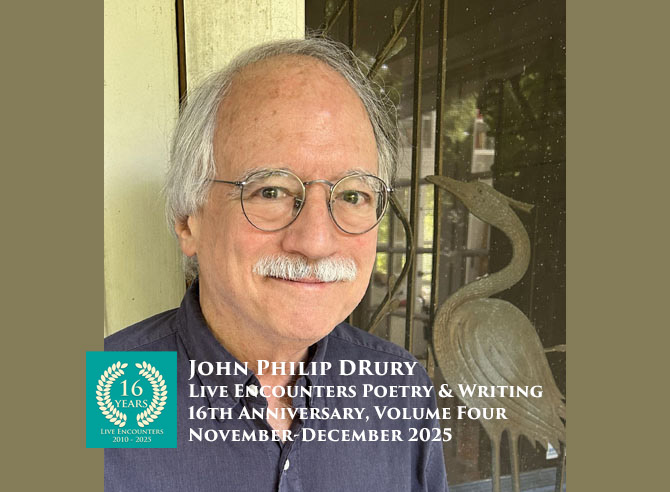
Live Encounters Poetry & Writing 16th Anniversary Volume Four
November- December 2025
Delivering the News, poems by John Philip Drury.
Delivering the News
I was always in the dark, bent over a stack of Washington Posts,
fumbling with wire cutters at the fat bale of newsprint.
Early morning, under street lights, I walked to the drop-off point and
could see, even from a distance, the flags of yellow notes (complaints),
or blue (start-ups), or red (cancels), creased beneath the wire I had
to cut. Long strands were shedding from the serrated edges of copies I
peeled apart, fitting the news into my battered red wagon.
I never threw a paper, too lazy to fold them. Instead, I walked up
the steps and dropped them on porches or wedged them behind
screen doors.
At night I went out collecting, dreading the sound of footsteps when
I rang a bell or banged the knocker, hoping for silence. Each lit window
was a diorama. And I fantasized that if a door opened a girl would
invite me to her bedroom, or a woman with a martini would ask me
to rub her back. I spent the money as I got it, instead of paying the
distributor first. At month’s end, I had to beg my mother for cash to
pay off the bill.
On empty streets, I paused halfway through my route to check
basketball scores, approaching dark houses where something was
starting to hum: a kitchen suddenly lit, a car warming up in the garage,
a dog scratching at the door to get out.
Poplar
One evening when I was in the kitchen, spooning mayonnaise into
crabmeat, the whole room turned blazing white with a flash, and a
rifle blast cracked. A voice outside the apartment squealed “Hoo-ee!
Damn!” and started whistling.
Lightning had hit the tallest tree on the lawn, a poplar, spiraling a
gash around the bark, whittling off long strips that scattered on the
grass. I’ve read that lightning starts upward from the ground, where
positive particles shoot up to meet the negative, as though the target
volunteered itself. But there were other trees close by, almost as
large and more exposed, and cupolas, weathervanes, telephone
poles that could have attracted the lightning.
When I went outside, I saw the pickup sticks of splinters, bark peeled
and curled like truck tires beside an interstate, and a broken wooden
platform with nails sticking out on one side and metal brackets on
the other. A neighbor had built it for squirrels, jamming ears of corn
on the nails. Now, crossing his arms, he declared that the tree was dead.
But I wasn’t sure. The coil of exposed wood didn’t quite girdle the
trunk of the poplar, though a section had buckled, bulging out like
a door handle, and its color was partly the rosé of a sunset we’d
missed because of the gathering clouds.
One nail remained in the tree. A red ant crawled down toward the bark.
On a branch above the damage, a squirrel was rubbing its paws.
And the leaves made a dry ringing sound from the wind that was
stirring, a shimmer of tambourines. I couldn’t stop looking at the
wood’s bloody tint and the gash like a rip in a coat seam, exposing
the lining, the hanging strands.
The neighbor said, “No, it’s a goner. After winter, the leaves won’t come back.”
But how could he know? Was it dead already, though glittering and
imposing, like El Cid in full armor, strapped to his charger as it moved
among cheering troops? I’d like to be so lucky when lightning hits:
to explode from within and throw off what nails me shut, what
hardens me against the elements.
After Labor Day
Out on the beach, a crowd in terrycloth has gathered on a mess
of wreckage, stepping carefully, like paramedics—or that’s what I
suppose from seven stories up.
But when I leave my shaded balcony and walk across the sand,
I realize the darkened patches there are rocks and seaweed, low
tide’s revelation of the depths of shallows—pools of sand-colored
fish, almost invisible, like fighter squadrons painted the vacant
color of the air, and then a gliding slab, a triangle like a Stealth
bomber flying low: a stingray.
People with long tubes, poking at conchs and whelks, wade from
slick rock to clear puddle, unnerving crabs that snap back with
white claws at white prods.
Not much ocean is left beneath the pier where rods are holstered,
pails of fish dropped back in waves beyond the surf that’s now
regrouping, this day of rain, sun, shade, when everything darkens
and flares, like jalousie windows shuttering, where a sandcastle
abandoned at the high-tide line—a pyramid with runes of scallop
shells—remains unsmashed, while barefoot strollers pocket coins
with whorls and ripples, a bank vault blown wide open.
© John Philip Drury
John Philip Drury is the author of six poetry collections: The Stray Ghost (a chapbook-length sequence), The Disappearing Town, Burning the Aspern Papers, The Refugee Camp, Sea Level Rising, and most recently The Teller’s Cage (Able Muse Press, 2024). His first book of narrative nonfiction, Bobby and Carolyn: A Memoir of My Two Mothers, was published by Finishing Line Press in August 2024. After teaching at the University of Cincinnati for 37 years, he is now an emeritus professor and lives with his wife, fellow poet LaWanda Walters, in a hundred-year-old house on the edge of a wooded ravine.

